THE 42 wants to speak to former Ireland international Glenn Whelan for a one-on-one chat now that his career has ended, but the outlook is not promising
“I will ask Glenn, but to lower your expectations I should add that he’s yet to do an interview during his time here,” comes the Bristol Rovers club official’s response.
Whelan’s apprehension is unsurprising and understandable.
The 39-year-old has spent more than half his life as a professional footballer, with the media among his fiercest critics over the past two decades.
They weren’t the only ones to doubt him, however.
“Every time you ask Glenn to step up to that next level, he does it,” former Stoke boss Tony Pulis told reporters a few years ago.
“He’s a good lad, very single-minded. He’s got that Celtic blood in him and the determination to prove people wrong — including myself at times.”
In many ways, those remarks are the story of Whelan’s career.
Growing up in Clondalkin and representing Cherry Orchard as a youngster, he joined Man City and moved to England at 15.
During his time there, he lived with a group of Irish players that came and went, including Paddy McCarthy, Stephen Paisley, Damien Joyce, Willo Flood and Brian Murphy.
Their presence helped alleviate feelings of homesickness.
“I was a year younger than [most of] them playing-wise,” he tells The 42, after a coveted contact number is finally secured a couple of inquiries later and weeks after the initial request. “So they looked after me or maybe bullied me a little bit, I don’t know, whatever way you look at it,” he jokes.
“I have two younger sisters, so it was as if I gained [a few] older brothers.
“We bounced off each other to get through the tough times. We were living our dreams. We were playing football every day and we had friends back home that were still going to school and college and stuff like that. So we were the lucky ones.
“But Man City at the time were really good. Whenever we were going through sticky patches or having a bit of a tough time, they’d send us home for a week or two to try to get over that.
“But like most things, once you come back to Ireland for a few days, you were only itching to get back and you realised how good we did have it.”
Whelan is in a reflective mood during the course of a wide-ranging chat, as he looks back on a remarkable career distinguished by perseverance, graft and a continuing ability to confound his critics.
He spent several years at City but made just one first-team appearance — replacing Paul Bosvelt as a substitute during an August 2003 Uefa Cup match against Welsh club Total Network Solutions.
A firm believer in the importance of playing men’s football as early as possible, Whelan featured 13 times while on loan at Bury during the 2003-04 season.
He was disappointed to leave City thereafter, but in hindsight the midfielder describes it as “the best thing” that could have happened, having grown sick of reserve football.
“I had a good chat with Kevin Keegan. And he basically said to me that there were a few clubs interested.
“He didn’t see me getting into the Man City first team so quickly, so it would probably be in my best interest to try to find something else.”
Whelan joined Sheffield Wednesday in League One on a free transfer during the summer of 2004.
The move went well initially. He scored and was named man of the match as Wednesday earned promotion to the Championship with a 4-2 playoff final victory over Hartlepool.
Though by the summer of 2006, Whelan was facing an uncertain future after being placed on the transfer list by manager Paul Sturrock amid increased competition for places.
However, the Dubliner would outlast Sturrock, as the latter was sacked with the Owls in danger of relegation during the 2006-07 season.
Sturrock’s successor, Brian Laws, removed Whelan from the transfer list as the midfielder earned a couple of Player of the Season awards by the end of that campaign and the team finished well away from the relegation zone in ninth.
Whelan’s fine form prompted interest from other clubs and eventually, he joined Stoke for £500,000 on transfer deadline day in January 2008.
Four months later, he would make his senior Ireland debut under Giovanni Trapattoni at the age of 24.
Like at club level, his international career was not without setbacks from the beginning. He narrowly missed out on a place in Brian Kerr’s Ireland U19s squad that finished fourth at the 2002 European Championships.
And even towards the very end of his Boys in Green career, Whelan was being written off prematurely. He was given an emotional send-off by fans at the Aviva Stadium in a friendly as Martin O’Neill’s side met Northern Ireland in what was assumed to be his last appearance at international level.
Yet Whelan went on to make a further six appearances under O’Neill’s successor Mick McCarthy before Stephen Kenny decided to go in a different direction.
Over the course of 91 caps, there were great memories for Whelan including two appearances at the European Championships and a couple of near misses in the playoffs.
While the football may not have always been the prettiest, Ireland, like Stoke, frequently punched above their weight, with Whelan a mainstay in the team for more than a decade.
But despite a sustained career with the Boys in Green, Whelan often drew criticism. Lauded as the consummate professional by those within the game, some people watching from the outside were less impressed.
The work he put in was often unseen, enabling the flashier and more dynamic players to grab the headlines.
“Over the years, I’ve taken a lot of flak from press and commentators,” he says. “But I was never out to please them. I never wanted to go and please someone on the TV or someone on the radio. For me, it was the manager and coaches and the players that I played with.
“I’d like to think that the players that I played with would have a high regard for how I trained and how I played and how I prepared.
“Although you’d like the limelight at times, and you’d like press and headlines and stuff like that; when it wasn’t going my way, it was never a factor of getting too disappointed about that.
“As long as the managers and coaches were all happy with how I was performing, then I knew I was doing the right thing.
“I think my role, playing as the holding midfielder, 10-15 years ago was a new role. Whereas now you see a lot of teams playing 4-3-3 and the deep-lying midfielder is the most important at the minute, so it was probably just a little bit of the wrong era at the wrong time for me [in terms of] grabbing headlines. But that was never a part of me wanting to be a footballer.”
Whelan was willing to accept criticism for his performances but felt it became too personal at times. Probably the most notorious example was when Eamon Dunphy on RTÉ was the latest in a long line of people to unfairly write off Whelan as a footballer while erroneously claiming he drove “two Ferraris” — though Dunphy has since suggested he went too far with his remarks.
“I think at times, [the criticism] got a little bit personal,” Whelan says now. “To be attacking where I was from and how I was brought up, no, that did hurt me.
“But reflecting on what I’ve done now and what I’ve achieved and the games I’ve played, I think my records in the league or internationally would stand up to anybody and that’s what I’m most proud of.”
Whelan’s media appearances became more infrequent as the criticisms from outside grew louder. Was this a deliberate blackout in response to the harsh words frequently coming his way from Dunphy and others?
“I never had any fears of doing press and doing interviews. I always thought that I spoke really well when I did do them. But for me, it was just a case of I didn’t need it. I wasn’t looking for headlines. I didn’t want to be friends with reporters, and I didn’t want people ringing up and just having a chat and speaking behind people’s backs. That was never my thing. It was always about the football for me.
“I knew when I played badly, I didn’t need reporters to tell me, or I didn’t need coaches or managers to tell me. I could tell you yourself about the games I played badly.
“I think now it’s different with social media, I think there are a lot of players out there who think they played well just because certain reporters might have said certain things. But that wasn’t the case for me.”
Members of the media were not the only ones to cast doubt on Whelan’s ability.
In 2018, Pulis told The Irish Mail on Sunday that during their five years working together: “We tried to sign someone better.
“We always looked for an upgrade on Glenn, someone we thought was more mobile, technically better, quicker, stronger, but every year the bugger would confound you by playing better and better and get his place back.”
Even after Pulis’ departure as manager, this pattern continued for a period, and when Whelan finally was sold by Stoke, the club were promptly relegated the following season.
And at a time when the Irish presence in the Premier League is at an all-time low, perhaps it is only with the benefit of hindsight that Whelan’s achievements in this regard can be fully appreciated.
His 277 games leave him 17th on the list of all-time Premier League appearances for Irish players.
“I think, in the nine and a half years that I was at Stoke, there were probably about 15 to 20 midfielders that came in,” he says.
“At one stage, I think it was between 75 and 80 million spent alone on midfielders to replace me. So I would speak to the managers and just ask them where they stand or where I stand. They just told me that I had to get in and fight for my place.
“So as long as I still had a chance of making squads and making the 11, then I saw it as a fight and it was a challenge and that was good for me also, because any new player that came in, it doesn’t matter how good or bad they were, I knew I needed to step up again and I was really proud of being able to do that and play so many games.
“I did see off quite a number of bodies that did come in and I think that’s why a lot of the Stoke fans have a great appreciation for me because of how I dug in and stepped up to the mark.”
Similarly, at 35, when Whelan’s Aston Villa contract was not renewed despite him playing an important role in gaining promotion to the Premier League, some players in a similar position might have been tempted to call it a day.
Yet the fire still burned bright and the veteran midfielder played on for another four seasons, encompassing stints at Hearts, Fleetwood Town and Bristol Rovers.
“I’ve found there are a lot of lads and a lot of older pros who when you get to that sort of age, it’s a pride thing, they don’t fancy going down to League One, League Two for their own egos and what they’ve done.
“For me, that was never a factor, I was always a professional footballer, and I always wanted to play as long as I could.”
It was only in his final season at Bristol that he started to become more peripheral, having played relatively regularly up to that point. Whelan even suggests he probably stuck around for one campaign too many.
“Last season when we got promoted on the last day of the season against Scunthorpe, I think that was the right time for me to hang them up,” he says.
“I was persuaded by the management and coaching staff down at Bristol to try and give it a go for another year just because we were struggling for players and injuries and just with the little bit more experience of being promoted and not many of our lads playing in League One beforehand, they thought that I’d be invaluable to them. So that was a part of the plan for staying on.
“But if I had my own choice after the Scunthorpe game, I would have definitely hung them up then just because of how things finished that season.
“But over the last 12 months, probably that fight and hunger wasn’t there as much as it should be and I didn’t want to hang around like a bad smell.
“Whenever I played, I wanted to play week in, week out, and that hunger had started to fizzle out and I didn’t want to stand in any young lad’s way. There were times I was needed for the bench or to play this year and I made sure that if there were other lads that were fit and available, they were put in before me.
“When I was younger, that wouldn’t have been the case. I always wanted to play every minute of every game no matter who you were playing against.”
Speaking more generally on his career, Whelan adds: “Reflecting on it a little bit, I wish I could have enjoyed it a little bit more while still playing and while things were going really well. But I was just fully focused on the next game.
“There were other players that probably had more ability than me and could just get on and play well on a Saturday. It didn’t matter how well they trained through the week.
“I really felt as if I needed to train 100%, to be at it all the time. Once I had the jersey it was all about keeping that and not giving it up and I’d do all I could to keep that jersey for as long as possible.”
That intensity will not necessarily dissipate, however, now that Whelan has retired.
“I think it’s about your own mental health and how healthy you want to stay. For me, even though I’ve recently retired from playing, I’m still out grafting at the minute.
“I still try and get out and get a few runs in during the week or get a gym session here or there.
“I’ll try and be as healthy and as fit as I can. Just for my own kids — my own lad plays football, so I have to put it up to him all the time now when he wants to go out for a kickabout, so I’m going to show him how hard it is.”
Whelan currently works as a coach and his ambition is no different to when he was a player — he aims to manage at the highest level possible.
He is studying for his Uefa pro licence, helping out Paul Osam with Ireland U16s and working at Bristol alongside manager Joey Barton — a familiar face from his days as a City youngster with the pair having a healthy respect between them despite kicking “lumps out of each other” during their playing days.
And the message youngsters should take from Whelan’s career is clear: “When someone tells you ‘you can’t’ or ‘you won’t,’ then just go out and prove them wrong because there has been many a time when people have said ‘no’ to me and I’ve used that for my own mental strength going forward to prove them wrong.”
Whelan will consequently attempt to instil that same drive into up-and-coming footballers just as one coach, in particular, helped him forge a successful career in the game.
“For me, the biggest influence was probably Frankie Bunn at Man City when I was a kid.
“Because he was the one that drove me every day. To be honest, for a long time, I thought he didn’t like me. He was on my case morning, noon and night regarding everything.
“And I would have thought that he picked on me a little bit and I was thinking I can’t do anything to impress him.
“But it’s only now, the older you get, you actually realise he was the one that had the most faith in me and was pushing me more than anybody because he had seen something in me that no one else did.”






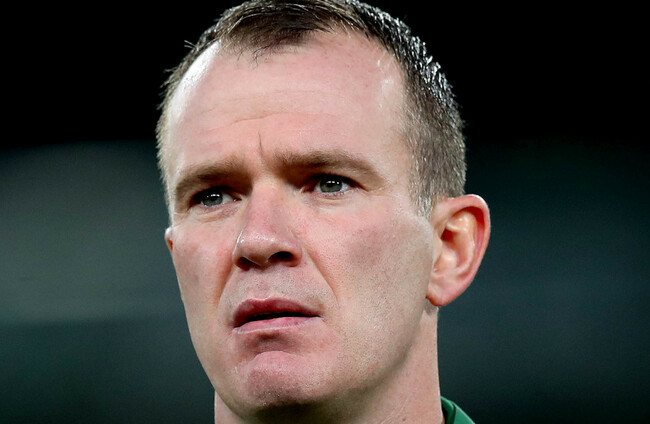

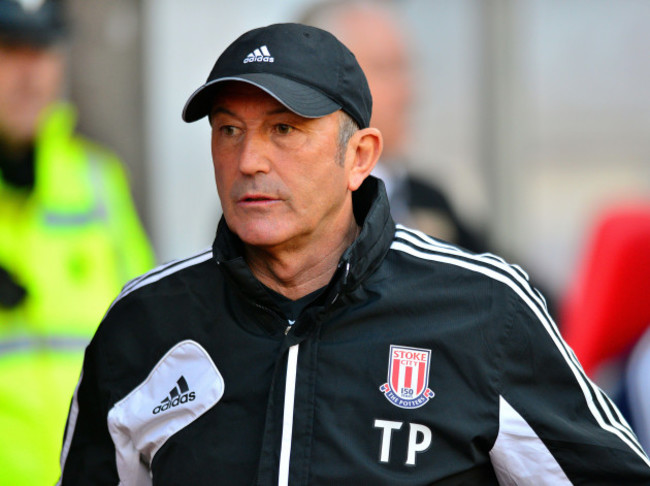
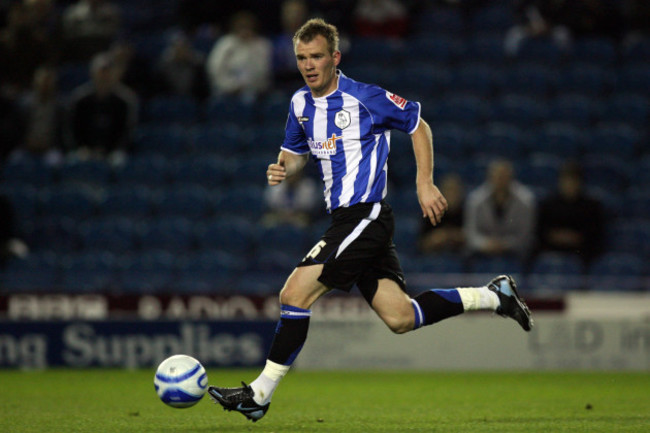
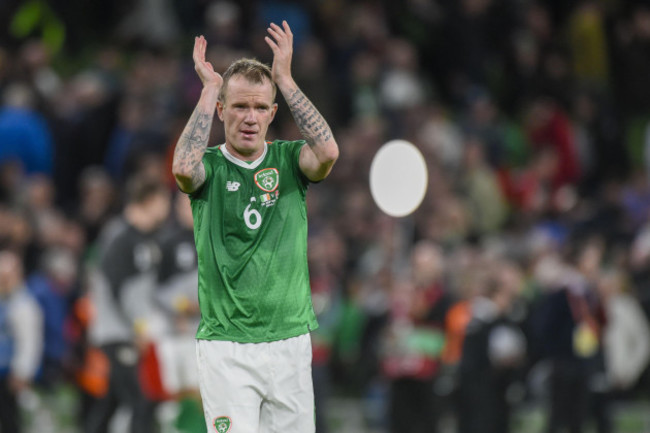
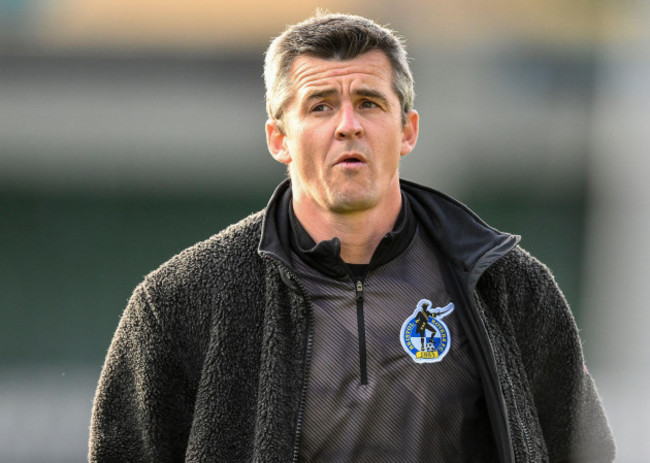
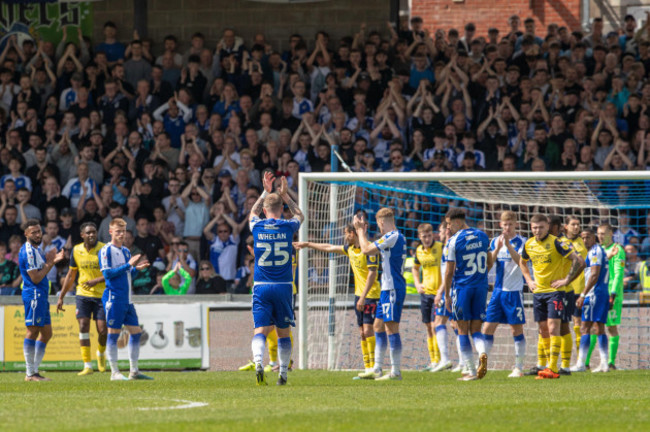





More movement from the bottles than his midfield
He’s great to watch ! Better than united at the moment unfortunately
That clown Jose makes it all about himself He loves it. United really in a bad place at the moment. Playing really poor.